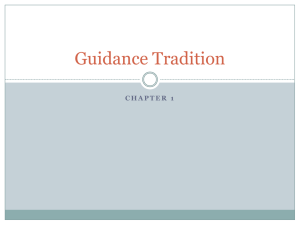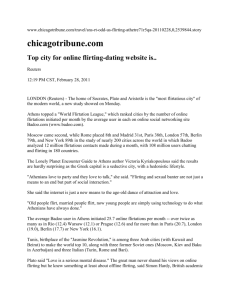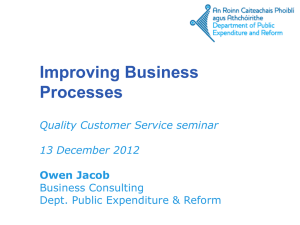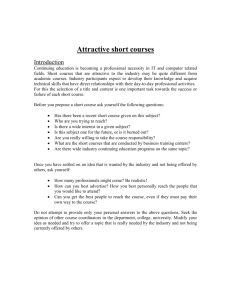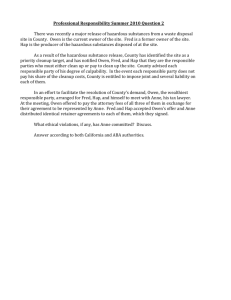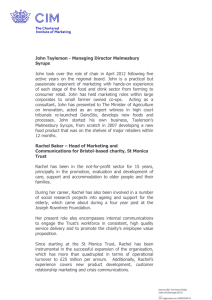In Today's Workplace, Women
advertisement
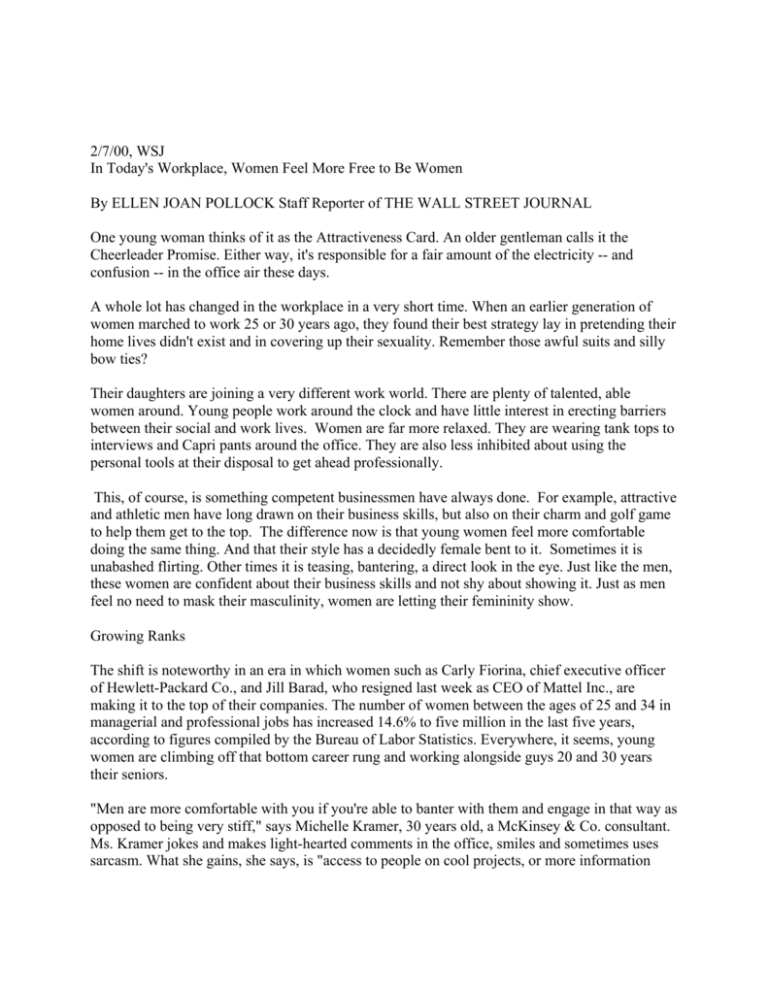
2/7/00, WSJ In Today's Workplace, Women Feel More Free to Be Women By ELLEN JOAN POLLOCK Staff Reporter of THE WALL STREET JOURNAL One young woman thinks of it as the Attractiveness Card. An older gentleman calls it the Cheerleader Promise. Either way, it's responsible for a fair amount of the electricity -- and confusion -- in the office air these days. A whole lot has changed in the workplace in a very short time. When an earlier generation of women marched to work 25 or 30 years ago, they found their best strategy lay in pretending their home lives didn't exist and in covering up their sexuality. Remember those awful suits and silly bow ties? Their daughters are joining a very different work world. There are plenty of talented, able women around. Young people work around the clock and have little interest in erecting barriers between their social and work lives. Women are far more relaxed. They are wearing tank tops to interviews and Capri pants around the office. They are also less inhibited about using the personal tools at their disposal to get ahead professionally. This, of course, is something competent businessmen have always done. For example, attractive and athletic men have long drawn on their business skills, but also on their charm and golf game to help them get to the top. The difference now is that young women feel more comfortable doing the same thing. And that their style has a decidedly female bent to it. Sometimes it is unabashed flirting. Other times it is teasing, bantering, a direct look in the eye. Just like the men, these women are confident about their business skills and not shy about showing it. Just as men feel no need to mask their masculinity, women are letting their femininity show. Growing Ranks The shift is noteworthy in an era in which women such as Carly Fiorina, chief executive officer of Hewlett-Packard Co., and Jill Barad, who resigned last week as CEO of Mattel Inc., are making it to the top of their companies. The number of women between the ages of 25 and 34 in managerial and professional jobs has increased 14.6% to five million in the last five years, according to figures compiled by the Bureau of Labor Statistics. Everywhere, it seems, young women are climbing off that bottom career rung and working alongside guys 20 and 30 years their seniors. "Men are more comfortable with you if you're able to banter with them and engage in that way as opposed to being very stiff," says Michelle Kramer, 30 years old, a McKinsey & Co. consultant. Ms. Kramer jokes and makes light-hearted comments in the office, smiles and sometimes uses sarcasm. What she gains, she says, is "access to people on cool projects, or more information where I needed to dig deeper. And also a structure, a network of people. I've been able to keep the support network and mentorships going, which leads me into good jobs or work." A young woman who works at Johns Manville Corp. puts it this way: "They like to see a smiling face, especially in this corporation, which is male-dominated" and where many of the men are in their 50s. "I would never want to take it that extra step with the people I work with, but it is the same thing. You walk up like you're happy to see them. It's a more enthusiastic interaction, like you would with someone you were interested in. I guess it's flirting, but goodness knows I'm not trying to take anyone home from here." Triumph or Betrayal? That sort of attitude raises a hard question. Does this represent the triumph, or the betrayal, of the feminist movement? Gloria Steinem, a founder of the women's movement, and Patricia Ireland, president of the National Organization for Women, both applaud the ease with which young women can now express themselves at work. "It means that there are more women, so there's a critical mass of women who therefore feel more at ease than the one-and-only or the three were in the past," Ms. Steinem says. But she is skeptical about whether flirting is going to benefit young women in the long term. "At one level I suppose men who are silly enough to be subject to charm deserve it," Ms. Steinem says. "But I question how far that gets anybody in real life. I think this is part of a learning experience." Ms. Ireland calls flirting "a short-term strategy in this culture. In this culture attractive means young. And you will only be conventionally attractive -- that is, your flirtiness will only be considered interesting and intriguing, rather than pathetic -- as long as you are still young and conventionally attractive." Plus, she notes, flirting "confuses, at best, the people you're working with, and at worst encourages -- perhaps entitles -- them even to engage in behavior you may not welcome." In fact, men sometimes are left with doubt about exactly what is on women's minds. That's why Leonard Brown, 49, calls it the "Cheerleader Promise." "It's all a smile and a promise of more," says Mr. Brown, an engineer. Some women's attitude is "just maybe, just maybe if you're nice," he says. “Wat goes through my mind is that No. 1, I want to call it out for what it is -manipulation, psychological manipulation. If you're going to have sex with him, go and have sex with him." Just Doing Business Of course in the vast, vast majority of cases, nobody's actually having sex with anybody. The only thing getting done is business. "You sort of learn what tricks you have in your bag. Definitely intelligence is one and attractiveness is another," says Chelsey Owen, 30, who cofounded the Summit Employer Group, an online human-resources firm. "I've talked to my friends about how you play that card of attractiveness. For the most part, we've come to peace with the idea that you get your foot in the door because of your great smile and because you're pleasant to look at." Ms. Owen likens her use of her looks and manner to someone else using a connection to get in the door. "We all sort of leverage what we've got." In a perfect world, she says, a "rock-solid pitch" would be enough to open doors. But, she adds, "we're dealing with human beings, so sometimes something will motivate them to allow you to talk." Ms. Owen especially relies on that something at networking events and trade shows. She says she's not shy about approaching an industry leader or CEO of a publicly held company "because of the feedback I get as an attractive woman." Even if she is sure that "on paper, there's no reason they would want to talk to me," she says "because you can take advantage of the physical presence, it's pretty likely that they're not going to completely ignore me." This isn't to say that Ms. Owen always turns on the charm. "I read them," she says. "This is one of those sort of gray areas. If I'm meeting with a man who is being very professional, I will match that." When an older businessman treats Ms. Owen paternally, she will slip into the daughter role. "If it makes them more comfortable, I don't have a problem playing into that dynamic," she says. In that case she will often ask more questions than are really necessary. "Sometimes they want to be, 'Oh sweetie, how's your business going?' I can be offended by that or keep my eye on the bigger picture." Many men, especially those who are confident that they have already reached the top, say they have no problem with women dressing in an eye-catching way or flirting. "People who are wealthy use their wealth. People who are smart use their intelligence," reasons a corporate lawyer in his 50s. "Why shouldn't women use their good looks or femininity?" 'Challenging' Stereotypes Brian Bogosian, 42, CEO of Valens Information Systems Inc., applauds the willingness of young women "to challenge the traditional stereotypes and make the workplace a more interesting place to work." They are fun, he says, and that is important in offices where 10- to 12-hour days are the norm and social and professional lives blur. "I've had women in their 20s say things to me, and I'll be somewhat at a loss for words," he says. "A lot of it is good-natured teasing," he explains. Like when he is ready to leave work on a jog and women say, " 'This should be interesting ...' Or, 'Should we be ready to call 911 if you're not back in an hour?' " But for some men, that kind of banter is more confusing than fun. "Men's sex drive is their biggest source of vulnerability," says Warren Farrell, who writes about men and their relationships with women. For a man, especially if the woman is young and attractive, "It's like being an alcoholic and seeing drinks all around him," he says. "If she tends to flirt or use tears, he knows he can easily be manipulated," Mr. Farrell says. "And so the vulnerability produces a number of things that make him even more vulnerable. He is much more likely to crack a joke that has some sexuality in it because he's feeling insecure and he wants to test the waters to see if she is responsive to him." The woman, he says, may play along, even if she feels uncomfortable, for fear of alienating him. That, in turn, will cause him to misinterpret her signals. A Pivotal Mistake Ultimately, Mr. Farrell concludes, "He's made more vulnerable by the consequences of any misinterpretation with the wrong person." Actual sexual-harassment charges happen rarely, Mr. Farrell notes, but, he says, "It only takes one mistake in a man's life to have a potential for ending his career or significantly hampering his career." Mr. Brown, the engineer, argues that sexual-harassment laws protect women who flirt because "it can be done safely." "Men are hard-wired to respond to women who they find attractive," Mr. Brown says. "Women know it. They test it." At the federal agency where he works, says Mr. Brown, "What I've seen is that we've hired young bright women, and because they were cutesy and because the men were attention-starved, they found they didn't have to continue to develop" professionally. Mr. Brown recalls one young woman who "played the flirtation card for all it was worth," and got on the fast track to promotions. "That's what males' anger in the workplace ends up being: They realize that when all things are equal, that females have the advantage. If you have an advantage you shouldn't be allowed to use it." In offices a decade or so ago, women often adopted a much more somber business demeanor, and that style hasn't changed much as they have climbed the corporate ladder. Older women are "just a little sterner than I think younger women are," says Michelle Brancheau, 28, who recently left Unilever to join an Internet start-up. For her, charm is "just one tool in your tool kit. Older women don't use charm as much. They probably just use pure brains and their position of authority or whatever." The 'Nonsexual' Strategy The deportment gap doesn't surprise Freada Klein, 47, an organizational development consultant. "The boomer women, we had to figure out how to walk a fairly narrow set of acceptable behaviors," she says. And then there were the stereotypes. "If you displayed an overt sexuality, you were undoubtedly sleeping your way to the top," she says. Because that allegation was "right there, ever present," Ms. Klein says, some baby boomer women reacted by being "nonsexual" at work. "I think you find the same thing in racial situations and ethnic situations," Ms. Steinem says. "The first and onlies, the tokens, the embattled few, have suffered a lot on our behalf. And therefore they have bruises. And when you touch a bruise you get a different response than when you aren't bruised." The younger women feel they shouldn't have to twist themselves into knots to create a special office facade that leaves out their femininity. For her generation, says Ms. Owen, of Summit Employer Group, "integration" of all aspects of their personalities is what she calls a "major theme." "We're much more spiritually awake or aware of the different parts of our lives, and they're not disconnected," she says. "There was a time in which people would look at compartmentalizing as a good thing, a mark of strength. Now, the pendulum has swung to the opposite. Strength is in being able to fully integrate all parts of your life and have a single persona. That requires true strength." The tide, of course, may change. Some women, Ms. Owen included, say they flirt less as they gain experience. Zia Fuentes, 27, who until recently worked at Ameritech Corp., says that when she started work there was a huge age gap between her and many of her colleagues. "I got a lot of 'honey, baby, sweetie.' I did kind of take that and use it," she says. "As I became more secure in things, of my knowledge and my abilities, I didn't do it as much, and people didn't react to me that way as much." Meanwhile, some men are turning the flirt factor to their own advantage. Robert Dunson, 36, a vice president at the Union Bank of California, says he recently closed a deal involving a man and his son and made sure he brought along a female colleague whom they both clearly liked. "If it helps them to be more comfortable, and being more comfortable makes them more open to what we're going to say, I'm going to use it in a heartbeat," says Mr. Dunson, who discussed the strategy with his female colleague beforehand. "It seems only natural to work with it, rather than against it. It is business." -Jonathan Kaufman contributed to this article. Write to Ellen Joan Pollock at ellen.pollock@wsj.com
